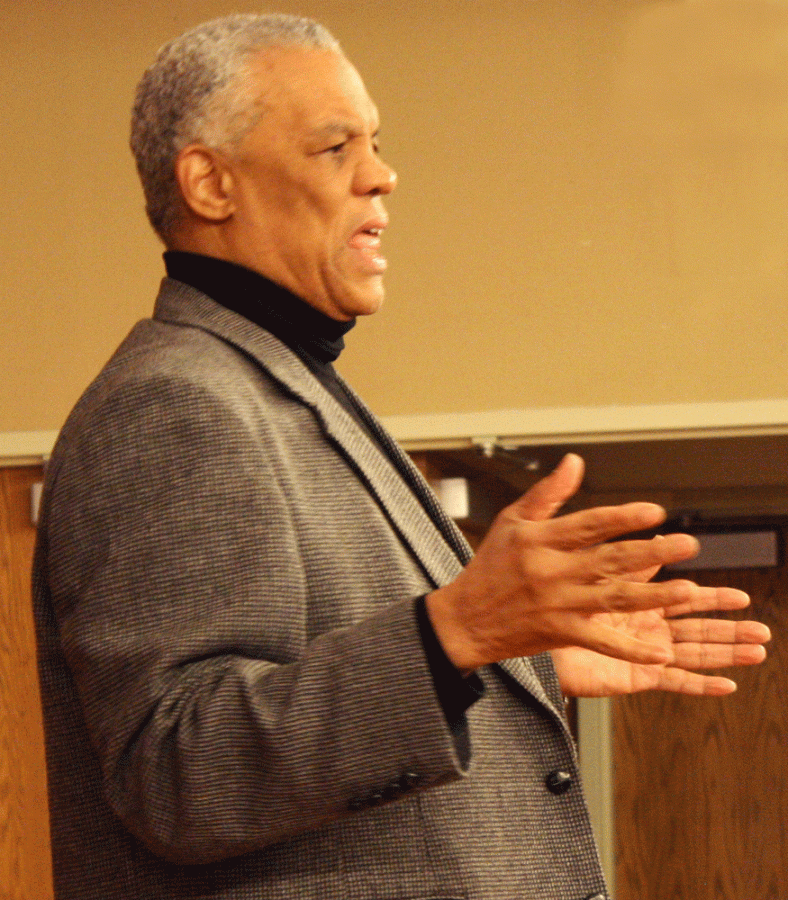‘Far from over’
Preston Love, Jr. discusses voting rights for African Americans
Preston Love, Jr. spoke to WSC last Wednesday about the evolution of voting rights pertaining to African Americans.
March 4, 2015
In 1984, Jesse Jackson, an African American, ran for President of the United States.
In 2008, Barack Obama finished what Jackson started.
UNL alumnus Preston Love, Jr. called these two men the “bookends of modern African American history as it relates to politics” when he spoke to a crowd at Wayne State College last Wednesday which was, appropriately, still in February—Black History Month.
Love, Jr., of North Omaha, was Jackson’s political campaign manager during his run for presidency in 1984. He also worked with many other renowned political figures, such as Andrew Young, former mayor of Atlanta. He did ground work for President Obama recently, but in his younger days he played football for the University of Nebraska under Coach Bob Devaney, when the Cornhuskers won the Orange Bowl against 5th ranked Auburn.
Now, Love, Jr. is an adjunct professor at UNO, and is also working with the North Omaha Voter Participation Project (NOVPP), which provided transportation for North Omaha voters to the polls last summer.
The topic of the 73-year-old Love Jr.’s talk was, in summary, the evolution of voting rights as they pertain to African Americans.
“I wanted you to see and feel the 15th Amendment as a response [to the limitation of voting rights], and the Civil Rights movement as a response [to the 15th Amendment],” Love, Jr. said.
“And now here we are.”
According to Love, Jr., America has come a long way from what it used to be. He recalled his days in Omaha as a young man, having to sit in the balcony of a movie theater to catch a film, or sitting in a completely different room from white people when his family went out for a fish dinner.
He also recalled a favorite place to get ice cream, despite the fact that there, too, he was discriminated against.
“What you’re looking at,” Love, Jr. said, “is a person who lived black history—a great part of modern black history. I have not only read about it, no, I have lived it.”
But the Civil Rights movement was not only based on who could sit where during a fish fry. It was a response to the 15th Amendment.
The 15th Amendment states, “The right of citizens of the United States to vote shall not be denied or abridged by the United States or by any state on account of race, color, or previous condition of servitude.”
When the amendment was ratified in 1870, the African American community responded to it.
In the words of Love, Jr., “Negroes were given the right to vote. And what do you think we did? We voted. An overwhelming number voted.”
Since so many African Americans voted, the government installed impediments to voting: things like the Grandfather Clause, Jim Crow laws, criminal disqualifications and literacy tests—“asking you to do things you couldn’t do,” Love, Jr. said, such as reciting portions of U.S. documents.
If African Americans were now given the right to vote, same as white people, why was it being made so difficult for them?
“It was about the power,” Love, Jr. said. “The real issue was if the Negroes could vote, they’d wipe out the whites. And [the whites] didn’t want to give that power up.”
Love, Jr. asked the enthralled audience if anyone had gone to see the movie “Selma”, a film about the throes of Martin Luther King, Jr.
“It was a pretty good depiction of the real world; a snapshot of what was going on in the ‘60s,” he said. “I heard the stories behind the stories,” he told, mentioning that he personally knew around 80 percent of the people depicted in the movie.
“My message to you,” Love, Jr. said, “is to be careful of power.”
Now, in North Omaha, a $2.3 billion dollar, 15-year project is taking place. The problem? According to Love, Jr., there are no African American contractors working on the project.
North Omaha is predominantly African American residents, and Northeast Omaha also “has the highest level of concentrated poverty in the state; it has the highest concentration of unemployment,” Willie Barney, president of the Omaha Empowerment Network, told the Lincoln Journal Star in 2013.
“Our urban areas have so many problems,” Love, Jr. said. “Not overt racism, but urban poverty.”
What caused the problem?
According to Love, Jr., not giving African Americans jobs in their own neighborhoods caused unemployment. Unemployment caused poverty, and poverty is causing drugs, gangs and violence.
“[Employers] aren’t racist, they just don’t want to give us jobs,” he said.
The history of African American rights, including voting rights, has come a long way, but we are still living in that history, and it is far from over.
“I appreciate talking with you about the evolutionary story of black history as it relates to politics,” Love, Jr. said, followed by a request for a “sitting ovation.”
Jesse Jackson and Barack Obama may be the bookends, but it is still important to read the books in between.








